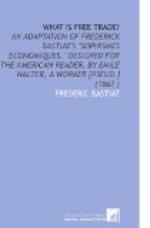F, owned the 4,000 ton ship Great Republic, which cost him $160,000. Finding her too large for profitable employment, and hearing that large vessels were in demand in England as troop transports to the Crimea, he sent her out in ballast and sold her in Southampton for $200,000 cash. With this sum he went to Geneva, where he invested it in Swiss watches worth $200,000 in Geneva, but $210,000 in New Orleans, ex duty and plus transportation. To New Orleans he accordingly shipped the watches, and they were sold. By these transactions he not only got rid of his elephant, but both he and the country clearly gained $50,000. Yet according to Mr. Greeley’s single eye the country suffered to the extent of $200,000, for in the exports appeared nothing, but among the imports $200,000 worth of foreign gewgaws, only fit to keep time with.
G, (an actual transaction) shipped by the Great Eastern on her last voyage from New York, lard and other merchandise, worth in New York $600,000, the fact of which, in the hurry of business, he failed to report to the Custom House, and it therefore did not appear in the exports. This lard was carried to England, where it found no sale, and was reshipped to New York. G only escaped being charged duty on it when it arrived, by swearing that it had been originally shipped from here in good faith; yet it was entered as an import (free of duty), and showed, according to Mr. Greeley’s one eye, that the country was on the road to ruin $600,000 worth.
H, lived in Brownsville, Texas, where he had a lot of arms and gunpowder, worth $100,000. The Mexicans levied a very high import duty on these articles, and they consequently bore a very high price in Matamoras, just opposite, being worth in the market of that town no less than $250,000. He accordingly conceived the idea of smuggling them into Mexican territory, and, with the connivance of the Mexican officials, (what rascals these foreign custom-house officials are, to be sure!) actually succeeded in doing so, and thus realized the very handsome profit of $150,000 in gold. The entire proceeds he invested in Mexican indigo and cochineal, worth in Mexico $250,000, and in Boston $275,000, in bond, plus charges. Of course, no export entry was furnished to the customs collector at Brownsville; but Mr. Greeley fastened his one eye on the indigo and cochineal, when it arrived in Boston, and made up his mind that the country had lost $250,000. As for H, he has invested $100,000 in more gunpowder and arms, and starts for Brownsville next week, to try his luck again. With the other $175,000 he has a notion of buying out the New York Tribune, and setting it right on free trade, and other matters of the sort.




